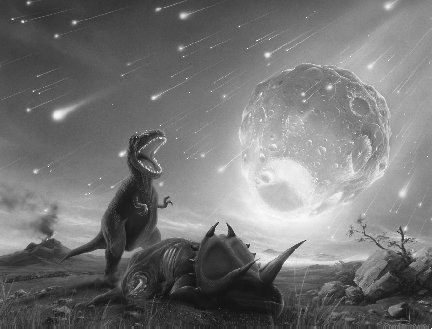(First published 3/17/11)
Just minutes before I left the house for our recent Eastport screening of What a Way to Go, a friend posted a video of the tsunami in Japan. It was the most striking footage I’d yet seen. I sat there, mesmerized by the unfolding flood, struck by how calmly it proceeded, how quietly, how inexorably. The water poured through the street, dragging everything along in its wake, from trashcans to cars and trucks and then whole buildings. From off in the distance came soft warnings over loudspeakers. The videographer, and the others nearby on the walkway from which the footage was taken, watched in silence as their world washed away below them. The video ended and I packed up my belongings and headed over to the Arts Center.
I hadn’t seen What a Way to Go in a while, and I was interested to see how it would strike me this time, especially while viewing it with “the home team.” I did as I had admonished myself to do, and just let it wash over me. And not too far in, I remember thinking, Wow! This is hard!
This was a new experience for me. I mean, sure, it’s not like I didn’t know that. But I’ve been living with this information for so long that I sometimes forget how desperately I used to avoid looking at it. Watching the movie again, I got a reminder of why that was.
As I watched, it occurred to me that, while the movie is hard, it’s not harsh. What a Way to Go simply proceeds like the tsunami did: calmly, quietly, inexorably. The tsunami did not feel angry or vengeful to me; it just felt powerful and unstoppable. That’s the experience I worked to create in the film. Because I knew, for myself, that when I stopped resisting, and just let that information flood over me, it dragged me to some place to which I’d never before been. And I knew that this new emotional and psychological “place” was a piece of “higher ground,” upon which I was very grateful to be standing.
Toward the end of What a Way to Go, Daniel Quinn speaks of the culture of Empire and its “secret plan”:
The secret plan is that we’re going to go on this way, no matter what, for as long as we can. I likened it to the secret plan in Nazi Germany. It was an open secret. Everyone knew that those Jews weren’t going off to resorts, or to have picnics in the woods. But no one talked about it. And no one talks about this either.
As I reflected on those words, I thought of the Japanese nuclear-plant crisis as an obvious example of how the secret plan works. We have to go on like we have been, don’t we? That’s obvious. So we’ll just have to role up our sleeves and grit our teeth and do what we have to do, including digging up the most dangerous substances on the planet and heating them to extreme temperatures in enormously expensive pressure-cookers with a proven history of failing, so that we can keep living the way we do. And, of course, with oil peaking and climate spiraling out of control, we’ll consider building even more nuclear plants, to solve the oil and climate problems. Empire is determined to go on for as long as it can. That’s how the culture is structured. It has no choice. Because if it didn’t act this way, it wouldn’t be Empire anymore, would it?
I realized, that night, that not only do Sally and I not participate in that secret plan, we have a secret plan of our own:
Our secret plan is to learn all there is to learn by facing directly into our present predicament. Our secret plan is to walk the path of personal growth and evolution, to rid our bodies and hearts and minds of the culture of Empire at every opportunity, even as we continue, of necessity, to live within that Empire. Our secret plan is to help others, who are ready, to learn the lessons arising from this time, and to learn those lessons so well, so deeply, so fully, that those humans who make it through this predicament and into the future (if any of us do) will not be inclined to carry the Imperial paradigm of control, domination and exploitation along with them through the bottleneck of environmental catastrophe. Our secret plan is to help redeem Empire’s millennia-long experiment with the paradigm of separation and control, by doing what we can to further the evolution of culture, consciousness and spirit, so that, at the very least, all of this pain and destruction will not have occurred for naught.
What a Way to Go can be a seen, then, as a tactic in service to our plan. It was designed as a tsunami of information and analysis and opinion and feeling that would flood the minds and hearts of those who could open up to it, sweep them out of their resistance, and drag them through the grieving process, hopefully to deposit them on the higher ground of surrender. The movie has nothing to do with waking people up so that they can fix our present situation and keep things going the way they have been. That’s Empire’s secret plan, and we do not serve that plan. What a Way to Go is about facing into that which cannot be fixed. It’s about grieving and surrender. It always has been.
Surrender, of course, is a curse word in the American lexicon. Just ask the French. We’re bootstrappers, we Americans. We get ‘er done. We lock and load. We keep on keepin’ on. We’ve taken it as our holy work, to progress, to succeed, to improve, to strive, to overcome, to manage, to shape, to solve, and to grow. Of course we have. You’ve got to do shit like that, when you’re serving the secret plan of Empire. Now, sure, all of these can be useful strategies in certain situations. Why, just now, I progressed across the kitchen floor and succeeded in improving my eggs by cooking them, overcoming their natural tendency to stay uncooked and managing to shape them into a nice yellow pile, thereby solving my immediate problem of hunger. I certainly used those strategies. Yay, me!
But we have a devil of a time, sometimes, we Imperialists, in noticing where and when those strategies are not appropriate. Take the matter of death, for instance. Ten thousand years ago this guy, call him Ed, no doubt despondent over the loss of a loved one to the jaws of a tiger, shouted to the heavens, cursing the gods. “Damn you,” he cried, shaking his fists. “This shall not be!” And Ed’s two buddies, Ned and Fred, standing nearby, looked at each other with raised eyebrows and said, “Shall not be? Now there’s an idea!” And thus was born the basic impulse of Empire, a millennia-long attempt, using everything from totalitarian agriculture and fossil fuels to nuclear power and Magnetic Resonance Imaging, to stave off loss and grief and death, and even to stave off any hints at those things that might arise when we experience physical or emotional discomfort, as a means of testing out Ed’s new idea. And our cultural war against discomfort and grief and death has, in turn, necessitated our collective war against the natural world. We’ve chewed up and spit out everything we could get our hands on, to keep ourselves as alive and as fat and as comfortable as we could be, and to make our numbers as many as we possibly might. We’ve covered the globe with human bodies, so that no single event, no single loss, could take us all out, like that tiger took out Ed’s loved one. Take that, death! Take that, grief!
Surrender then, would be the antithesis of that. One definition of the word I really love comes from the recovery community: to surrender is to lay down our arms and join the winning side. I submit that our present collective predicament is a direct consequence of our failure to take seriously that which we all know: in the matter of living bodies in this physical realm, discomfort and loss and grief, what the Buddha termed suffering, come to us all, and death IS the winning side. There’s no getting by that. In the end, Mr. Death is going to knock at our door, and he’s not coming to do our taxes. No matter what we believe regarding where he might be taking us next, the fact remains that we don’t get to stay here. Most of us have never truly come to grips with that uncomfortable fact.
Now, this is not a new observation, I admit. But, as we seem to have trapped ourselves in a world-spanning industrial culture based on Ed’s bone-headed notion that we can avoid discomfort, loss, grief and death, I think it bears repeating. We’ve gathered up every bit of food we can, piled it inside our mansions of sticks and drywall, dug out and cut down and burned up everything we could find to keep ourselves warm and dry and comfortable, and surrounded it all with a tiger-proof fence, only to find out, now, that this strategy has been … ahem … inappropriate. Doh! We’ve treated death as a problem to be solved rather than a predicament to be pondered and surrendered to. And our refusal to surrender to grief and death has brought us, ironically, to a time of boundless collective grief, and to the brink of extinction itself.
By failing to surrender to grief and death, we’ve continued to make the mistake that Ned and Fred made: Ed’s anger at death was not a place to stay stuck; it was simply a part of a natural, deeply human process to go through. Had they just taken Ed in their arms and held him as he raged, stayed with him as he ranted and cried, supported him to fully feel what he felt, walked beside him as he tried and failed to deny the loss, listened without judgment as he bargained with the gods to get his loved-one back, and brought him warm soup and firewood as he sank into the depths of loneliness and despondency, they’d have done what truly needed to be done. And they would have seen that, in fact, Ed, like all humans, was fully capable of surviving his grief, of moving through it, and of then reinvesting in life again. They’d have seen that, rather than tear him apart or make him weak, the loss and grief actually strengthened Ed, and gifted him with the power to live his life with more genuine presence than perhaps he ever had before. They’d have learned that that’s one of death’s greatest gifts: it helps we who are living to live more fully.
Alas, Ned and Fred ran off and started this comfort-addicted culture called Empire and here we now are, facing the consequences of their mistake. And it’s rather a mess, ain’t it? But now, seeing this, we can consciously choose where they did not. We can choose to continue to test Ed’s new idea. That would be Empire’s secret plan. Or we can lay down our weapons and join the winning side, finding Death an extraordinary advisor, and using our new-found friend to bring us back to life right in the midst of our own lives. We can take on some of that Japanese wabi-sabi, look for the beauty within the imperfections and discomforts of life, and learn to accept peacefully the natural cycles of growth and decay. In doing that, we may just stand a chance of learning what there is to learn in our present predicament, such that we might actually redeem the mistake of Ned and Fred. That feels worth trying to me.
The tsunamis of oil depletion and climate change and environmental decline and economic meltdown will flood over us, slowly, calmly, and inexorably. The laws of physics and chemistry and biology feel neither angry nor vengeful to me; they are simply powerful and unstoppable. Empire’s secret plan will fail, because it has taken up arms against death itself, and death will not be conquered. Not in the physical realm. Not with the strategies Empire has chosen. But death can be surrendered to, and joined, even befriended. And down that path, I think, lies our best opportunity for the growth and evolution that can bring some measure of redemption to all of this loss. That’s the secret plan we’re following. You’re welcome to join us. You may have already done so. We don’t know. That’s the thing about a secret plan: because we don’t talk about it, we don’t really know who’s on which team.
Our limited viewpoints from these physical bodies make it difficult to see what other secret plans might be afoot. The Cosmos may have a secret plan. And the Absolute or Divine. Gaia herself may have a secret plan. Or the sun. Or the aliens. The powers-that-be may have a secret plan very different from that made inevitable by the framing conditions of the dominant culture. And I don’t know about you, but I’ve noticed a great many herds of domestic animals lately, huddled nose-to-nose in their pastures. I think maybe they’re secretly planning something too.
It’s comet time here on Planet Earth. We’re staring smack into the unknowable and unsolvable. The dinosaurs of Empire will thrash and stomp and bellow as they die out. We tiny mammals with our own secret plan try to stay out of their way, and even trip them up as best we can. There’s no telling how this will all play out. I expect many things, but mostly I expect to be surprised.







here the thing ….
the money supply is debt. first it is borrowed
into existence to the point of credit destruction
then stolen into existence by elites to finance the
final fraud.
either way, it is a failed ponzi scheme in full saturation,
the perfect instrument to do leveraged raids of sovereigns
stupid and corrupt enough to fall into the trap.
self induced monetary chaos can’t end well for those
of us who don’t appreciate the significance of the
nature of the money system itself. it is an energy
extraction tool and a whip sold as a medium of exchange.
.
financially engineered rolling leveraged sovereign take downs,
ongoing. the plan from 1913.
end the fed and their notes.
we are human beings. not sprogs for / in a corrupt and failed
design of a money machine. look and think
.
John Trudell , I’m crazy ?
http://www.youtube.com/watch?v=ctUecTdPEO0&feature=related
link.
http://www.youtube.com/user/peacsees
Surprise is definitely in the mix! Who would guess a fruit seller would start the “Arab Spring” movement? Greece is about to vote on austerity…they have been warned with calamity if they do not pass it, so they will likely vote “yes,” but I sure wish they would vote “no” on this! Send a message to the bankers and powers that be, the people are sick and tired of bailing out the bankers! That would be a great surprise. In the global warming mix, everyday brings new scientific surprises. We ain’t seen nothin’ yet! This promises to be just chocked full of surprises! Peak oil will produce still more surprises. When is that peak? What will the downslope look like? In this “hypercomplex” (as Kunstler calls it) world we have created, nobody can predict how it will look, what will start crashing first, what or beloved politicians will attempt as a band-aid, and so on.
For most people, the biggest surprise of all, although it should be no surprise since the facts on the ground are there for all to see, will be the unraveling of the “Green Revolution” (GR) that accompanies climate change and peak oil. The one-two punch will come from harsh and ever-changing growing conditions for our food crops, and a scarcity of hydrocarbon energy our food products are so heavily dependent upon. Exit GR. The current population is 6.9 billion people was largely made possible by the GR. As the GR unravels and exits, much less food (calories) will be available, which is a nice way of saying a lot of people will be hungry. Enter the greatest famine ever to strike the planet, driving our numbers to pre-GR levels of approximately 3 billion people (read, 3.9 billion people die). A lot of people, most people, will be surprised by this too.
Tim,
Excellent tsunami analogy, and wonderfully cogent retelling of the story of Empire. Where I might suggest a slightly different take is this: we are not so much a “comfort-addicted culture”, since the democratization of the affluence that allows comfort is quite recent and still poorly dispersed, as we are a power-addicted culture. We hope to use the power of knowledge and control to wrest our little sanctuary of comfort and stability from the chaos of a natural world which doesn’t often comply with our wishes.
Agriculture was our first cultural use of power-over to re-design nature to meet our hunger and leave us with surplus (profit). From that occasionally-successful surplus arose division of labor, hierarchy, mercenaries, serfs and slaves, clergy, inherited status, wealth and poverty, cities and then nation-states, empires, and millennia of terrible suffering, epidemic disease and ceaseless warfare.
The somewhat generalized relative comfort of the “developed” world is merely the bone tossed to the masses to keep us mesmerized and compliant, and participant in this death-denying and death-dealing paradigm. But even that token concession to our complicity is now being taken back as the minions of Empire strive madly to extract the last ounce of gold for themselves before there is no more.
Gaia is helping disintegrate this decrepit Empire of delusion with her tsunamis and storms and quakes, but it hardly needs her assistance, as it is built on such a shaky foundation that it is already collapsing of its own unsustainable weight. Dinosaurs fall hard when they succumb. Ironically, the “comet” that’s coming to earth this time is the life-giving rays of the sun slowly heating up a planet which has been re-engineered for our selfish desires. By so long denying Death, we have turned the very source of Life into the engine of our own undoing. Not only Death, but the Great Second Law of Thermodynamics cannot be evaded with impunity.
http://transitionvermont.ning.com/profiles/blogs/the-thermodynamics-of-an
Hey Robert! Thanks for your kind words. Hope all is well with you. You still in VT?
Thanks for your thoughtful analysis. I’m not sure it has to be an either/or. I think I could generate a longer list of “objects” toward which the dominant culture displays addictive tendencies. Perhaps power and comfort are just two parts of the same equation.
If I look at a substance addiction to tease this apart, I wonder: Is the alcoholic addicted to the alcohol, or to whatever it is the alcohol gives him or her, or both? If we focus on the alcohol as the “reason” for addiction, then we find ourselves blaming the bad substance, it seems. If we focus, instead, on what it is that the alcohol is providing (or fixing, or alleviating, etc.), that forces us, I think, to begin to face into whatever it is that’s missing from our lives, or from our culture, that we might need the alcohol FOR. We can then begin to sort out how our lives and our culture are not making us happy. Ultimately, both the substance and the missing piece play a part in the addiction. Perhaps, early on, it’s the missing piece that “drives the reaction.” Then later, the substance itself takes a dominant role.
To take that back to the matter at hand, I tend to focus on the goal (comfort) rather than the “substance” used to achieve that goal (power-over), in order to focus on the “what’s missing” of our lives and our culture. I have found, over the years, that the power addiction is easier to notice, and that the most difficult thing for many to see is the inherent discomfort and unhappiness of life in this supposedly rich, happy land. So I put my focus on that.
Perhaps, with regards this culture, the power was the dominant factor early on, and comfort the dominant factor later? Both still in play all the while, but driving the reaction in different ways at different times, and in different places. As I write from an American perspective, my thinking likely fails to apply all around the world.
Anyways, further musings… Thanks for checking in!